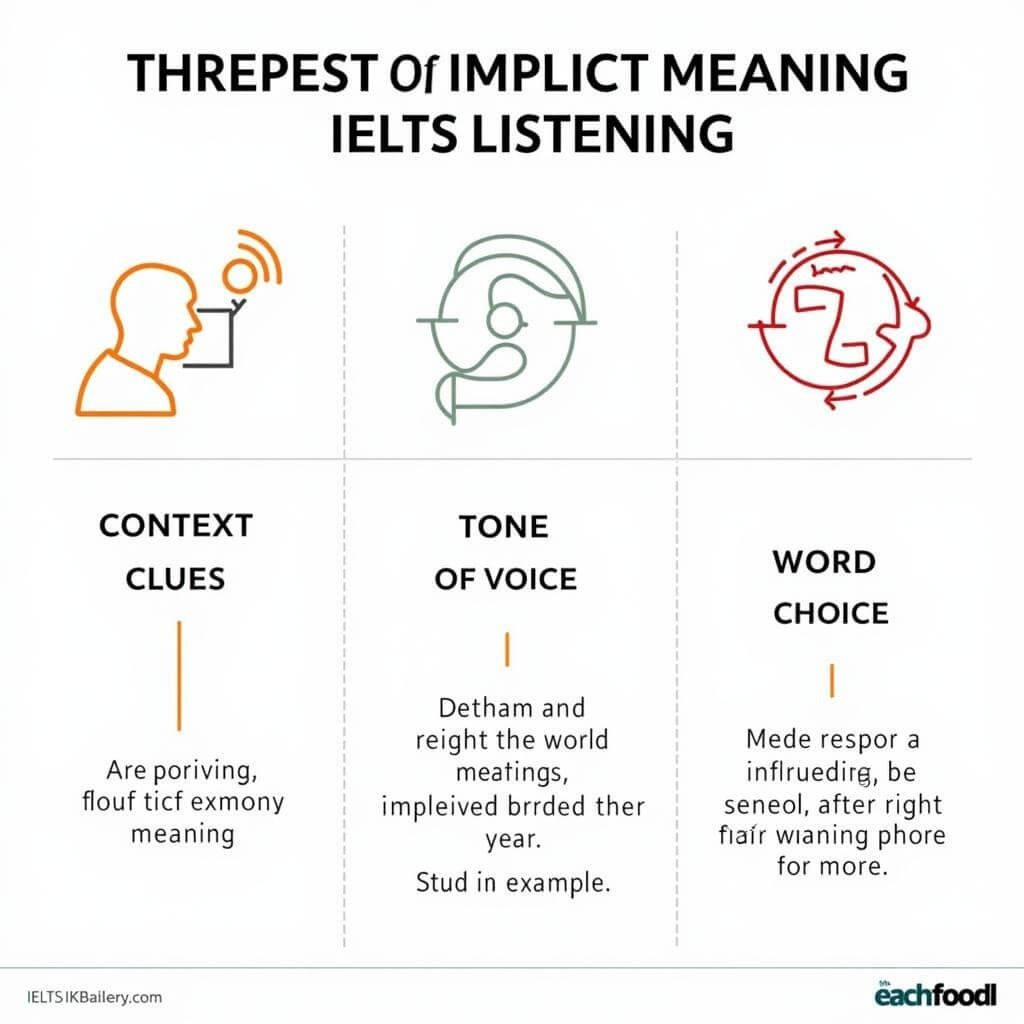Understanding Implicit Meaning in IELTS Listening
Listening for implicit meaning is a crucial skill in the IELTS exam, particularly in the Listening section. It involves understanding information that is not directly stated but implied through context, tone, or choice of words. This skill requires candidates to read between the lines and make inferences based on the speaker’s message.
Why is it important?
In real-life communication, people often convey messages indirectly. The IELTS exam reflects this reality by including questions that test your ability to understand implied meanings. Mastering this skill can significantly improve your overall Listening score and prepare you for effective communication in English-speaking environments.
Key Aspects of Implicit Meaning
1. Context Clues
Context plays a vital role in deciphering implicit meanings. Pay attention to the overall situation, the relationship between speakers, and any background information provided.
2. Tone of Voice
The speaker’s tone can convey emotions, attitudes, or intentions that may not be explicitly stated. Listen for changes in pitch, speed, or emphasis to gather additional information.
3. Word Choice
Speakers often use specific words or phrases to imply meaning without stating it directly. Understanding nuances in vocabulary can help you grasp the underlying message.

Examples of Implicit Meaning in IELTS Listening
Let’s explore some examples to better understand how implicit meaning works in IELTS Listening:
-
“I suppose we could go to the beach this weekend.” (Implies reluctance or lack of enthusiasm)
-
“That’s an interesting approach to the problem.” (Could imply disagreement or skepticism)
-
“Well, I’ve seen better presentations.” (Implies the presentation was not good)
-
“It’s not the worst idea I’ve ever heard.” (Implies the idea is not great, but acceptable)
-
“You might want to reconsider your strategy.” (Implies the current strategy is not effective)
-
“I’m sure you did your best.” (Could imply the result was not satisfactory)
-
“Let’s just say the meeting didn’t go as planned.” (Implies the meeting was unsuccessful)
-
“I’ll think about your proposal.” (Often implies rejection or hesitation)
-
“That’s one way of looking at it.” (Implies disagreement or an alternative viewpoint)
-
“It’s certainly a unique approach.” (Could imply skepticism or disapproval)
Applying Implicit Meaning Skills to IELTS Listening Tasks
Multiple Choice Questions
In multiple choice questions, pay attention to options that paraphrase the implicit meaning rather than directly quoting the audio. The correct answer often requires you to interpret the speaker’s tone or intentions.
Matching Tasks
For matching tasks involving attitudes or opinions, focus on understanding the overall sentiment expressed by the speaker, not just individual words.
Short Answer Questions
When answering short answer questions, consider the context and tone to infer information that isn’t explicitly stated in the audio.
Common Pitfalls in Interpreting Implicit Meaning
- Taking statements at face value without considering context
- Misinterpreting sarcasm or irony
- Overlooking cultural differences in communication styles
- Focusing too much on individual words rather than overall meaning
- Ignoring non-verbal cues in the speaker’s voice
How to Improve Your Skills in Listening for Implicit Meaning
1. Practice Active Listening
Engage with various English-language media, such as podcasts, news broadcasts, and TV shows. Focus on understanding not just what is said, but also what is implied.
2. Analyze Conversations
Pay attention to everyday conversations and try to identify instances of implicit meaning. Consider how people convey messages indirectly in different situations.
3. Study Idiomatic Expressions
Many English idioms and expressions carry implicit meanings. Familiarize yourself with common phrases and their underlying messages.
4. Role-play Scenarios
Practice with a study partner by creating scenarios that involve implicit communication. Take turns being the speaker and the listener, then discuss your interpretations.
5. Use IELTS Practice Materials
Regularly work with official IELTS practice tests and materials that specifically focus on implicit meaning questions. Analyze your mistakes and learn from them.
Conclusion
Mastering the skill of listening for implicit meaning is essential for success in the IELTS Listening test and beyond. By understanding context, tone, and word choice, you can uncover the hidden messages in spoken English. Regular practice and exposure to a variety of English-language sources will help you develop this crucial skill. Remember, the ability to interpret implicit meaning will not only boost your IELTS score but also enhance your overall communication skills in English-speaking environments.